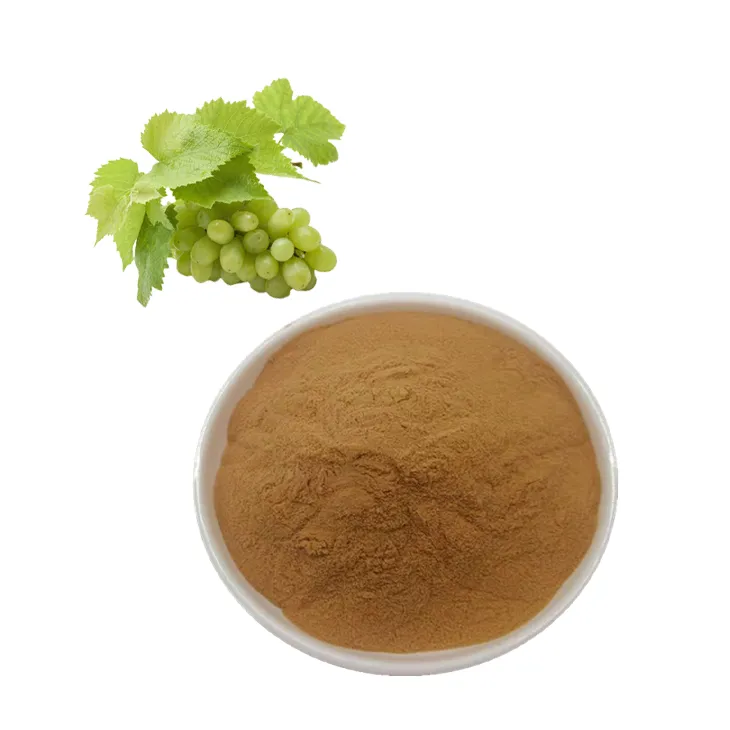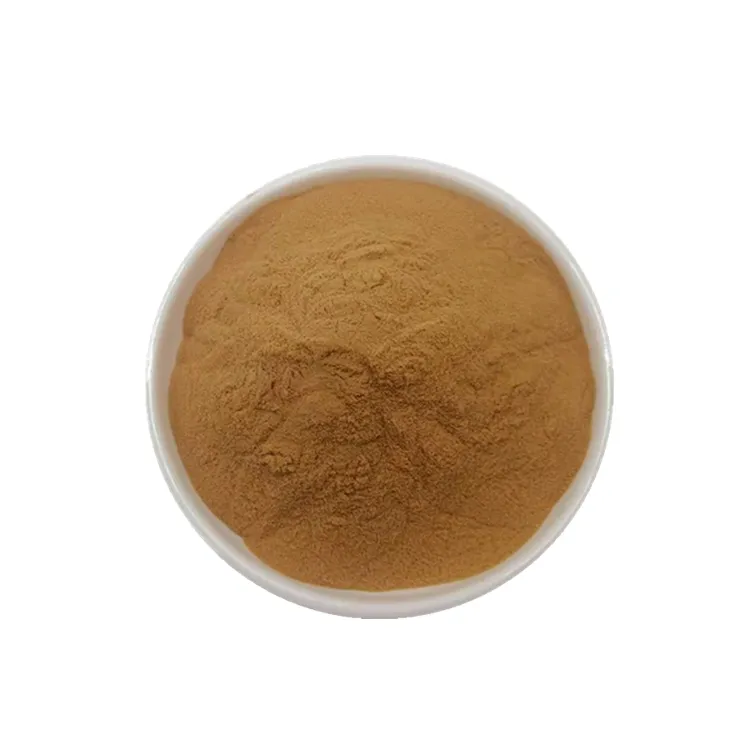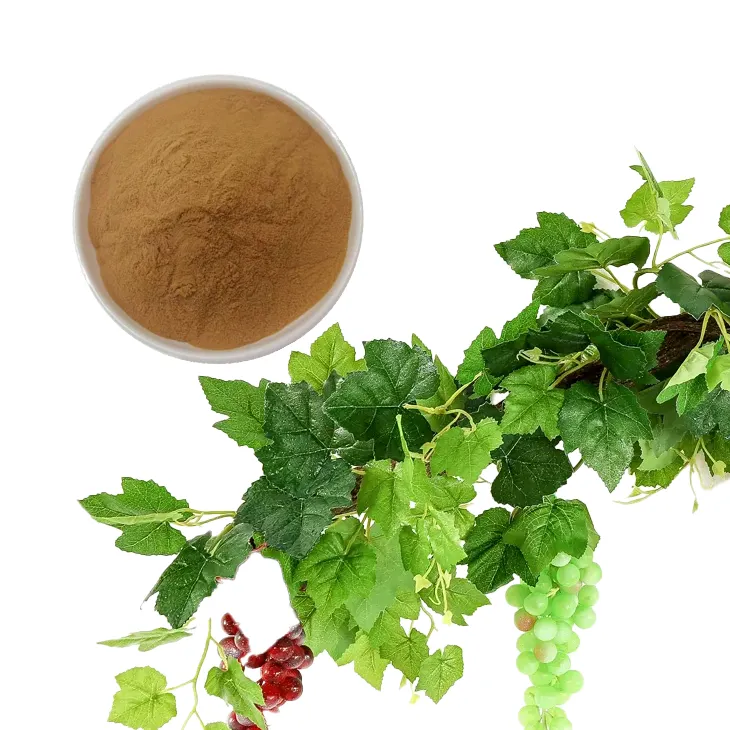- 0086-571-85302990
- sales@greenskybio.com
The flavor of mature grape leaves and natural grape leaf extracts.
2024-11-12

1. Introduction
Grape leaves, both in their mature form and as natural extracts, have a unique place in various aspects of human life. The mature grape leaves are often used in culinary traditions, while the natural Grape Leaf Extracts have found their applications in traditional medicine, cosmetics, and modern product development. This article aims to provide an in - depth analysis of the distinctiveness of their flavors, the benefits of the extract, and how they are related in different areas.

2. The Flavor of Mature Grape Leaves
Mature grape leaves possess a flavor profile that is both earthy and slightly tart. The earthy note comes from the fact that they grow in soil and are in close contact with the vineyard environment. It has a green, vegetal quality that is characteristic of many leafy plants.
The tartness in the flavor is a result of the natural compounds present in the leaves. This tart flavor is mild and not overpowering, making it a pleasant addition to various dishes. When tasted raw, the texture of the mature grape leaf is also a factor in the overall flavor experience. It is somewhat firm yet pliable, and this texture can influence how the flavor is perceived as it is chewed.
2.1 Culinary Uses and Their Impact on Flavor
In many Mediterranean and Middle Eastern cuisines, mature grape leaves are used in a variety of ways. One of the most common uses is in making dolmas, where the grape leaves are stuffed with a mixture of rice, herbs, and sometimes meat.
- When used in dolmas, the grape leaves impart their earthy - tart flavor to the stuffing. The flavor of the leaf melds with the other ingredients, adding a unique dimension to the overall taste of the dish.
- The process of cooking the stuffed grape leaves further modifies the flavor. The heat softens the leaves and can mellow out the tartness slightly, while also allowing the flavors of the stuffing to penetrate the leaf, creating a harmonious blend.
Another culinary use is in salads. Here, the fresh grape leaves are chopped or torn and added to a salad mix. Their presence adds a fresh, green flavor that contrasts with other salad ingredients like tomatoes, cucumbers, and cheeses.

3. Natural Grape Leaf Extracts
Natural Grape Leaf Extracts are obtained through various extraction methods. These extracts are concentrated forms of the beneficial compounds found in grape leaves.
3.1 Extraction Methods
- One common method is solvent extraction. In this process, a suitable solvent such as ethanol or water is used to extract the compounds from the grape leaves. The choice of solvent depends on the type of compounds that are desired in the extract. Ethanol - based extracts may be more effective in extracting certain lipophilic compounds, while water - based extracts are good for hydrophilic compounds.
- Another method is supercritical fluid extraction. This method uses supercritical carbon dioxide as the extraction medium. It has the advantage of being a clean and efficient extraction method, as carbon dioxide is a non - toxic and easily removable solvent. Supercritical fluid extraction can produce high - quality extracts with a high concentration of bioactive compounds.
3.2 Flavor Profile of the Extract
The flavor of natural grape leaf extracts is more concentrated compared to the flavor of whole mature grape leaves. It has a stronger earthy note and a more pronounced tartness. This is because the extraction process concentrates the natural flavor - contributing compounds.
However, the flavor of the extract can also be influenced by the extraction method and any subsequent purification steps. For example, if certain impurities are removed during purification, the flavor may become cleaner and more refined.

4. Benefits of Natural Grape Leaf Extracts
4.1 In Traditional Medicine
- Natural grape leaf extracts have been used in traditional medicine for their antioxidant properties. The presence of polyphenols, such as flavonoids and phenolic acids, in the extract helps to scavenge free radicals in the body. This antioxidant activity is believed to contribute to the prevention of various diseases, including cardiovascular diseases and certain types of cancers.
- Another benefit in traditional medicine is its anti - inflammatory effect. The compounds in the grape leaf extract can help to reduce inflammation in the body. This has been used to treat conditions such as arthritis, where inflammation of the joints is a major symptom.
4.2 In Cosmetics
- The antioxidant properties of grape leaf extracts also make them valuable in the cosmetics industry. They can be added to skincare products to help protect the skin from oxidative stress caused by environmental factors such as UV radiation and pollution. This can help to prevent premature aging of the skin, including the formation of wrinkles and fine lines.
- Grape leaf extracts also have moisturizing properties. They can help to improve the skin's moisture barrier, keeping the skin hydrated and supple. This makes them suitable for use in moisturizers, lotions, and other skincare products.
5. The Relationship between Mature Grape Leaf Flavor and Grape Leaf Extracts in Product Development
5.1 In the Food Industry
- In the food industry, the flavor of mature grape leaves can inspire the use of grape leaf extracts in product development. For example, in the creation of new types of sauces or dressings, the earthy - tart flavor of the extract can be used to add a unique flavor profile. This can appeal to consumers who are looking for new and interesting flavor experiences.
- However, it is important to note that the concentrated flavor of the extract may need to be adjusted to fit the overall flavor balance of the product. This may involve diluting the extract or combining it with other flavors to create a more harmonious blend.
5.2 In the Pharmaceutical and Nutraceutical Industries
- The benefits of grape leaf extracts in traditional medicine have led to their exploration in the pharmaceutical and nutraceutical industries. While the flavor of the extract may not be as important in pharmaceutical products (where efficacy is the primary concern), in nutraceutical products, the flavor can play a role in consumer acceptance.
- Manufacturers may need to find ways to mask or improve the flavor of the extract if it is too strong or unpalatable. This could involve encapsulation techniques or combining the extract with other flavors to make it more acceptable to consumers.
6. Conclusion
Mature grape leaves and natural grape leaf extracts each have their own unique flavor characteristics. The flavor of mature grape leaves is more nuanced and complex in its natural state, while the extract has a more concentrated flavor. The benefits of grape leaf extracts in areas such as traditional medicine and cosmetics are significant, and in product development, both the flavor of the leaves and the properties of the extract can be harnessed in different ways. Understanding these aspects can help in further exploring the potential of grape leaves and their extracts in various industries and applications.
FAQ:
Question 1: What is the characteristic flavor of mature grape leaves?
The flavor of mature grape leaves is often described as slightly bitter, with a hint of earthiness and a fresh, green aroma. This unique flavor can be attributed to the various compounds present in the leaves, such as phenolic compounds and terpenes.
Question 2: What are the main components in natural grape leaf extracts?
Natural grape leaf extracts contain a variety of components. These include polyphenols like flavonoids (such as Quercetin and rutin), phenolic acids, and stilbenes (such as resveratrol). Additionally, there are also elements like tannins, which contribute to the overall properties of the extract.
Question 3: What benefits does the natural grape leaf extract offer in traditional medicine?
In traditional medicine, natural grape leaf extract has been associated with several benefits. It has been used for its anti - inflammatory properties, which can help in reducing swelling and pain. It has also been thought to have diuretic effects, assisting in fluid regulation in the body. Some traditional uses also suggest it may help with digestive issues.
Question 4: How is the flavor of mature grape leaves relevant in modern product development?
The flavor of mature grape leaves can be relevant in modern product development in the food and beverage industry. It can be used as an ingredient in certain types of cuisine, such as in Mediterranean cooking where grape leaves are stuffed. In the beverage industry, the unique flavor profile can potentially be used to create novel, herbal - infused drinks. Additionally, in the cosmetic industry, the associated aroma can be used in products for a natural and fresh scent.
Question 5: How are the flavor of mature grape leaves and the benefits of grape leaf extracts connected?
The flavor of mature grape leaves and the benefits of grape leaf extracts are connected in that some of the compounds responsible for the flavor also contribute to the health - promoting properties. For example, the phenolic compounds that give the leaves their characteristic flavor also possess antioxidant properties which are beneficial as seen in the extract. So, in a way, the flavor can be an indicator of the presence of certain useful compounds.
Related literature
- The Chemical Composition and Bioactive Properties of Grape Leaf Extracts"
- "Flavor Profiles of Grape Leaves at Different Maturity Stages"
- "Traditional Medicinal Uses of Grape Leaves and Their Scientific Validation"
- "Innovative Product Development Using Grape Leaf - Derived Ingredients"
- ▶ Hesperidin
- ▶ Citrus Bioflavonoids
- ▶ Plant Extract
- ▶ lycopene
- ▶ Diosmin
- ▶ Grape seed extract
- ▶ Sea buckthorn Juice Powder
- ▶ Fruit Juice Powder
- ▶ Hops Extract
- ▶ Artichoke Extract
- ▶ Mushroom extract
- ▶ Astaxanthin
- ▶ Green Tea Extract
- ▶ Curcumin
- ▶ Horse Chestnut Extract
- ▶ Other Product
- ▶ Boswellia Serrata Extract
- ▶ Resveratrol
- ▶ Marigold Extract
- ▶ Grape Leaf Extract
- ▶ New Product
- ▶ Aminolevulinic acid
- ▶ Cranberry Extract
- ▶ Red Yeast Rice
- ▶ Red Wine Extract
-
Sugarcane Extract
2024-11-12
-
Fig Extract
2024-11-12
-
Citrus bioflavonoids
2024-11-12
-
Boswellia Serrata Extract
2024-11-12
-
White Peony Extract
2024-11-12
-
Peppermint Oil
2024-11-12
-
Kidney Bean Extract
2024-11-12
-
Coconut Water Powder
2024-11-12
-
Stevia Extract
2024-11-12
-
Citrus Aurantii Extract
2024-11-12





















